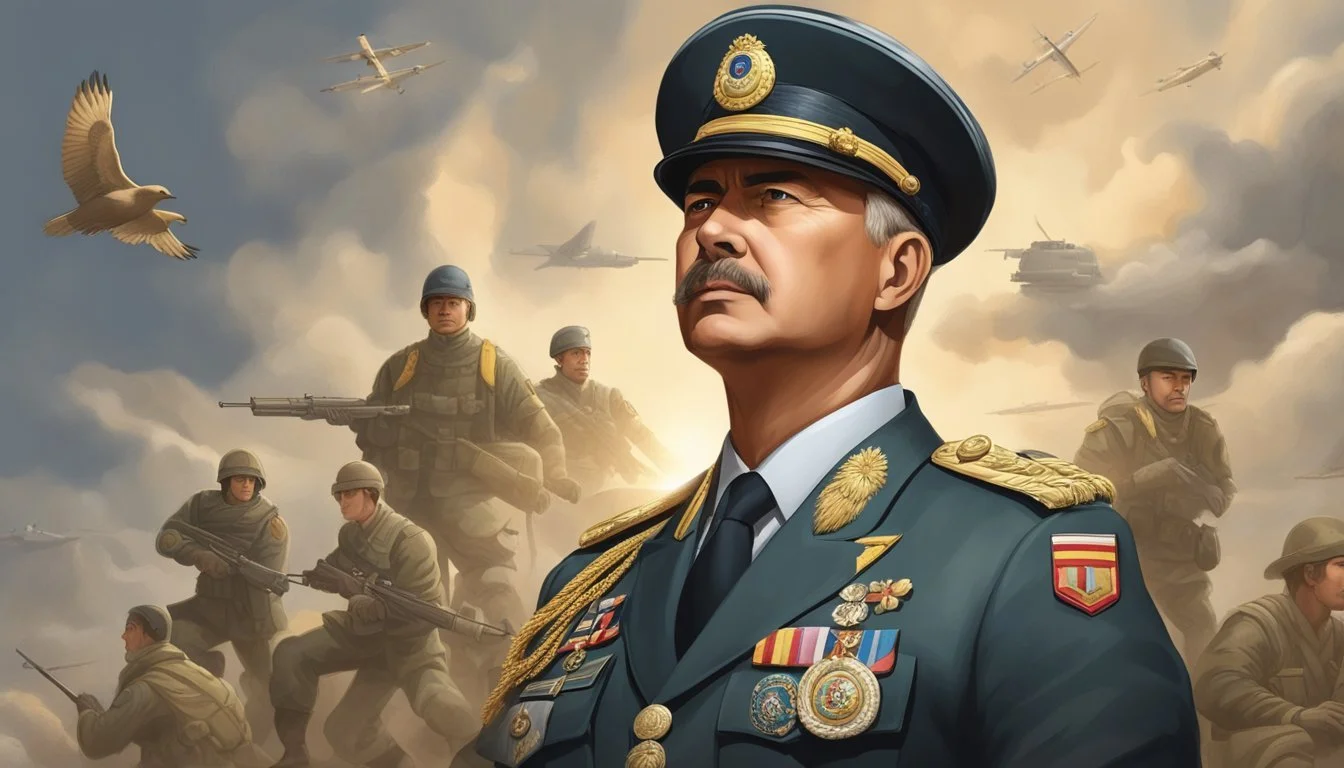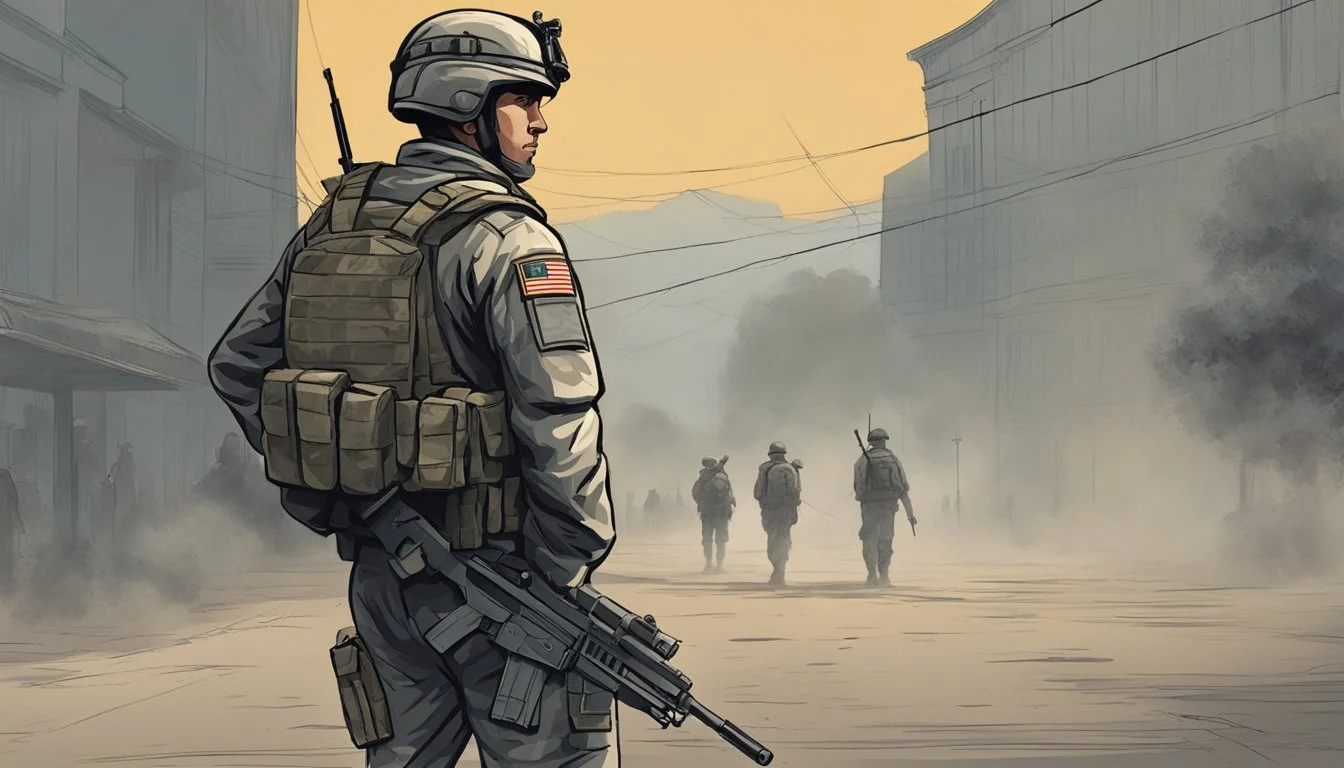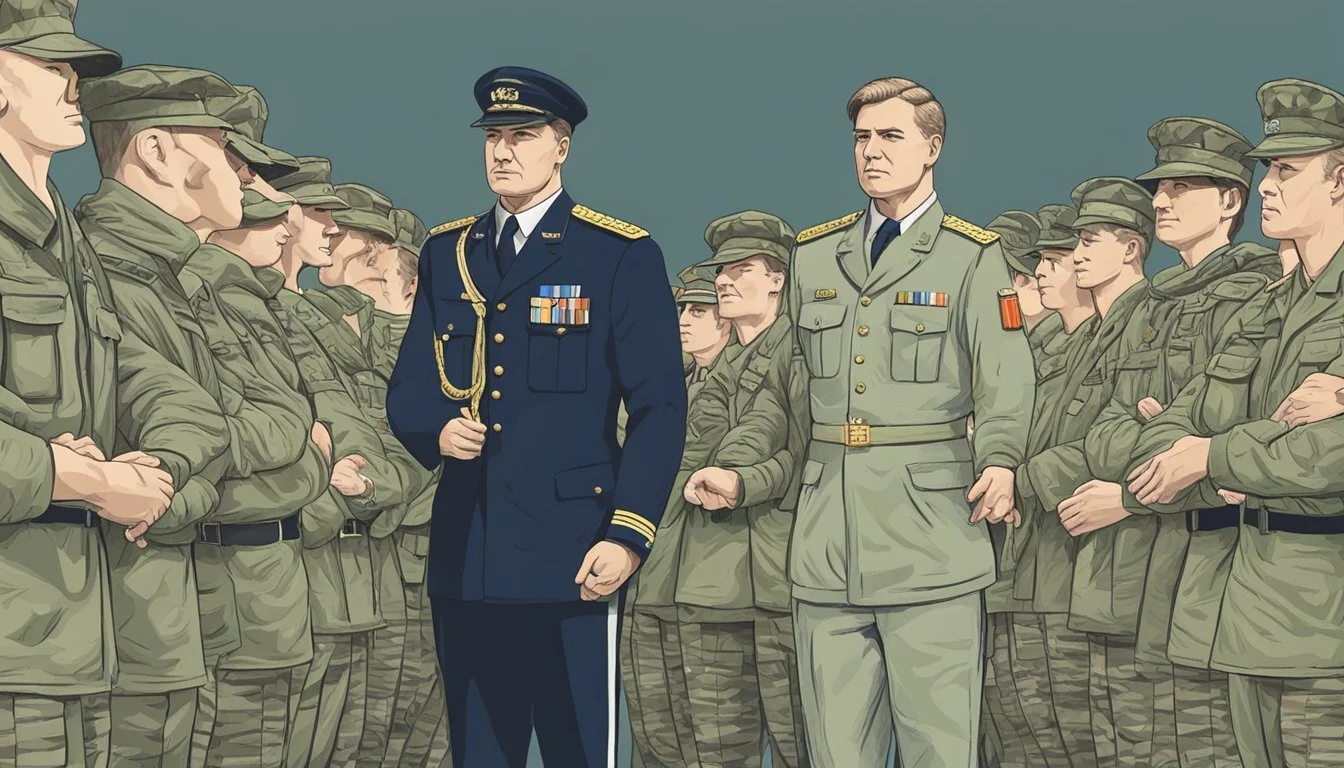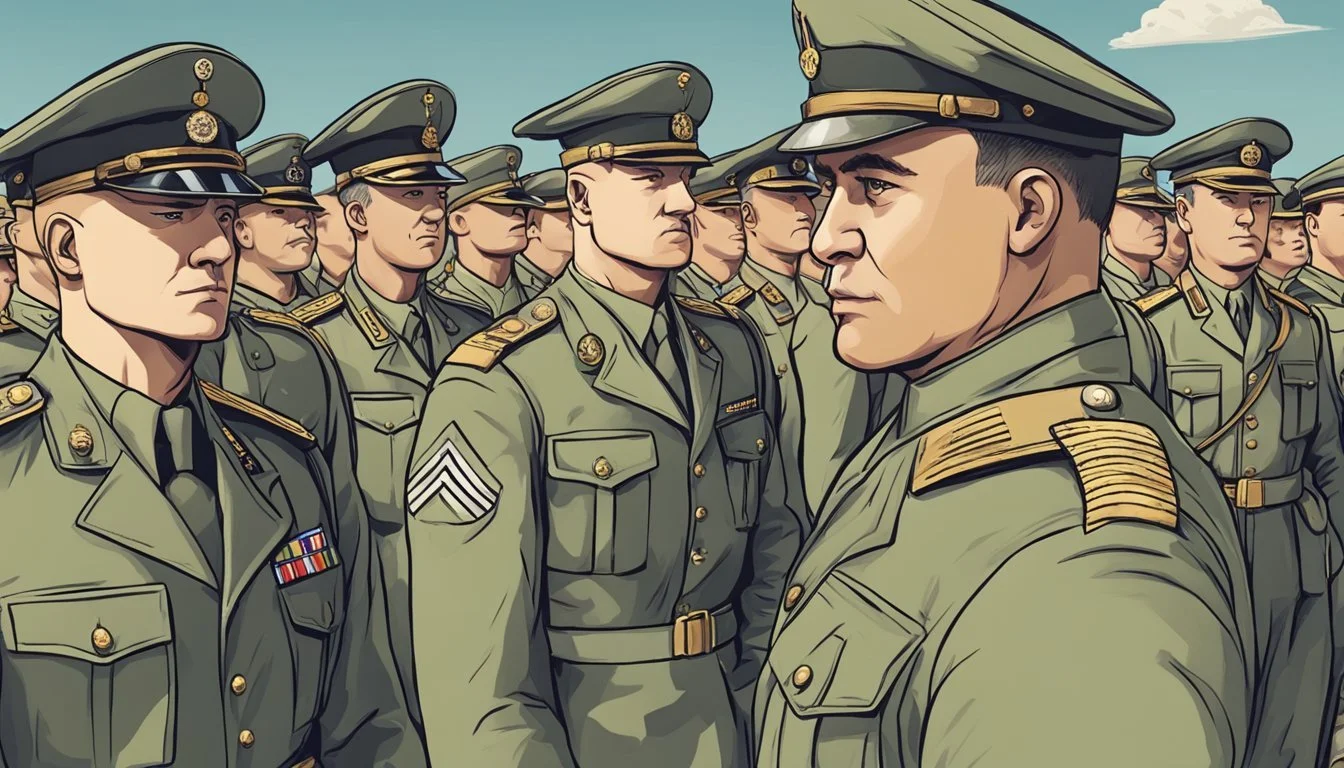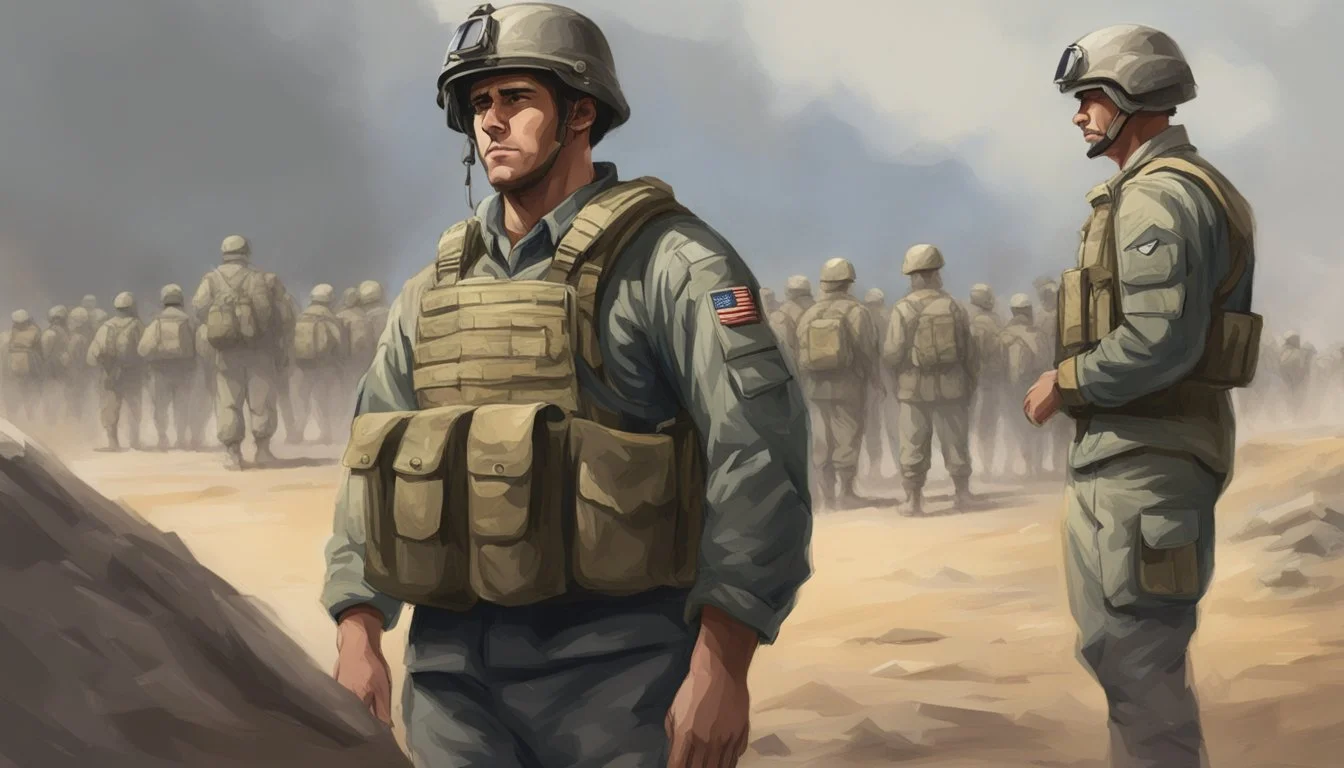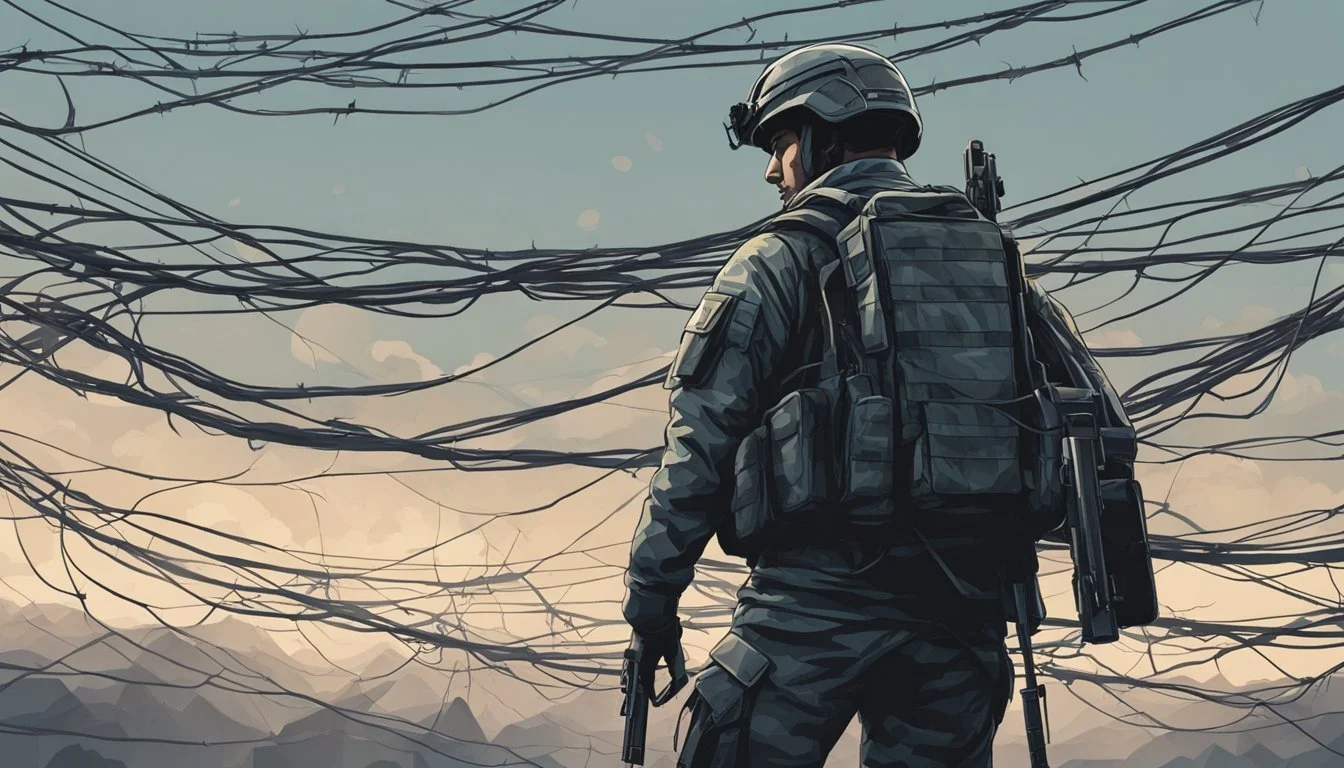15 Signs of Narcissistic Personality Disorder in the Military
Key Indicators and Examples
Narcissistic Personality Disorder (NPD) can significantly impact various aspects of life, especially in high-stress environments like the military. This condition is characterized by an inflated sense of importance, a deep need for excessive attention, and a lack of empathy for others.
Understanding how NPD manifests in military settings is crucial for maintaining the health and effectiveness of the armed forces. By recognizing the signs of NPD, leaders and peers can better navigate the challenges posed by individuals exhibiting these traits, ensuring a more cohesive and supportive unit environment.
1) Inflated sense of self-importance
Individuals with narcissistic personality disorder often exhibit an inflated sense of self-importance. In a military context, this can manifest as a belief that they are uniquely qualified for leadership roles, regardless of their actual experience or training.
They may frequently overestimate their own abilities and accomplishments, expecting recognition and admiration from others. This attitude can create friction within their unit as they might undermine or disregard the contributions of their peers.
Their exaggerated sense of self-worth might lead them to take unnecessary risks, believing themselves to be invulnerable or uniquely capable. This behavior not only endangers themselves but can also put their teammates at risk.
For more on the symptoms and signs of narcissism, visit Mayo Clinic and Verywell Mind.
2) Excessive Need for Admiration
Narcissistic Personality Disorder (NPD) often involves an excessive need for admiration. Individuals with NPD constantly seek validation and praise from others to boost their fragile self-esteem. In the military, this can manifest as a need for recognition from superiors and peers.
They may go out of their way to display their achievements. Often, their self-worth hinges on the accolades they receive. This drive for admiration can create tension within their unit.
A person with NPD may interpret lack of praise or attention as personal slights. As a result, their relationships with colleagues can suffer. This relentless pursuit of admiration can overshadow teamwork and collective goals.
Their actions may be viewed as self-serving or disingenuous. This perception can further strain interactions within the group. The constant need for external validation may also lead to burnout and frustration among peers.
For more information on this topic, check out this article about the need for excessive admiration.
3) Expecting Special Treatment
In the military, individuals with Narcissistic Personality Disorder often expect special treatment. They may believe they deserve priority over others based on their perceived superiority or achievements.
These individuals often demand privileges not earned by their rank or position. This behavior can create tension within units, as fairness and equality are core military values.
Service members displaying this characteristic may show dissatisfaction with procedures that level the playing field. They might also react negatively when expectations are unmet, leading to conflict.
Their need for admiration can translate into seeking constant approval from superiors. This can be a distraction and hinder effective teamwork, as the focus shifts from the mission to individual recognition.
In summary, the expectation of special treatment is a prominent sign of narcissistic personality disorder in the military, disrupting unit cohesion and operational effectiveness.
4) Fantasies of Power and Success
Individuals with Narcissistic Personality Disorder (NPD) often exhibit exaggerated fantasies of power and success. These fantasies are not aligned with their actual achievements.
They may daydream about limitless success, immense power, or ideal love. Such fantasies can be all-encompassing and persistent.
In the military, this can manifest as a desire for rapid rank promotions or unearned accolades. They might constantly imagine themselves in command positions.
This grandiosity can lead to unrealistic expectations and disappointment. It often hinders cooperation and team dynamics, as they feel superior to their peers.
Such individuals might also believe that only others with similar high status can truly understand them. This belief further isolates them from reality.
5) Believing they are superior
Individuals with Narcissistic Personality Disorder (NPD) often carry an inflated sense of their own importance. This sense of superiority can be especially pronounced in structured environments like the military.
They frequently display an attitude of arrogance, often speaking down to others and disregarding their contributions. This behavior can create significant tension within a unit, as teamwork is crucial in military settings.
Their belief in their own superiority can lead to dismissive attitudes toward their peers' opinions and ideas. They might ignore input from others, even when it could be beneficial to the mission or task at hand.
Such individuals may seek to position themselves in the spotlight constantly. They often feel entitled to special treatment and become upset when they don't receive it. This sense of entitlement can disrupt group cohesion and morale.
In addition, those with NPD tend to view others as inferior, further isolating themselves. This mindset can lead to poor interpersonal relationships within the unit and can be detrimental to group dynamics.
Overall, the belief in their own superiority makes it difficult for individuals with NPD to function effectively in collaborative environments like the military. Their arrogance and dismissive attitudes can hinder both personal and collective success.
6) Lack of Empathy
Narcissistic personality disorder (NPD) often includes a severe lack of empathy. Individuals with NPD usually struggle to understand or share the feelings of others. This trait can appear as indifference or insensitivity during interactions.
In the military, a lack of empathy can severely impact unit cohesion. Effective teamwork relies on mutual understanding and support, which an individual with NPD may find difficult to provide.
This lack of empathy is not just an emotional deficit. It involves a fundamental inability to recognize and validate the emotions of others, leading to strained relationships and increased conflicts within a unit.
Research supports that people with NPD have a deficit in empathy. They may appear self-absorbed and dismissive of their comrades' feelings, focusing instead on their own needs and desires.
This deficiency can also manifest as an exploitative behavior, where individuals use others without considering the emotional toll. Such behavior can undermine trust and morale, essential components in a military environment.
Moreover, individuals with NPD might display grandiosity and a fragile self-esteem, further complicating interactions and reducing the overall effectiveness of the team.
7) Exaggerating achievements and talents
Individuals with narcissistic personality disorder often inflate their accomplishments and skills. This is particularly noticeable in military settings, where hierarchy and achievements play a significant role.
They may claim to have completed missions or received honors that they did not. This behavior stems from their need to gain admiration and elevate their perceived status among peers.
Some may consistently overstate their role in successful operations or training programs. For instance, they might take credit for entire team efforts, presenting themselves as the mastermind behind significant successes.
In training scenarios, they could exaggerate their physical prowess or strategic thinking abilities. Over time, these fabrications can undermine trust within units and lead to credibility issues.
This pattern of behavior can complicate relationships with peers and superiors. Trust is vital in military operations, and exaggerated claims can erode the necessary confidence and reliability.
In evaluation settings, these individuals might present embellished records or testimonies to influence their superiors' perceptions. This can create an imbalance in the recognition and reward systems, affecting overall team morale.
To mitigate these effects, it's crucial for military personnel and leaders to verify claims through thorough evaluations and cross-references, ensuring that recognition is given fairly and accurately. More information on the symptoms of narcissistic personality disorder can provide further insights.
8) Feeling Entitled
Narcissistic individuals often display a strong sense of entitlement. They believe they deserve special treatment and privileges that others do not.
In the military, this can manifest as expecting to receive the best assignments or the highest accolades, irrespective of their actual performance.
These expectations can lead to interpersonal conflicts. Fellow service members may perceive the narcissist as egocentric and unfair.
If their expectations are not met, narcissists may react negatively. This can include feelings of resentment or anger towards those they believe are withholding what they "deserve."
Entitlement can also fuel a lack of respect for authority. Narcissists may challenge superior officers or ignore regulations and protocols they view as beneath them.
Feeling entitled often impairs teamwork. Narcissists might prioritize their own desires over the collective goals and needs of their unit, disrupting cohesion and morale.
The sense of entitlement complicates relationships. It makes mutual respect and collaboration difficult, often isolating the narcissistic individual from their peers.
Recognizing this trait is crucial in maintaining a functional and cooperative military environment. Understanding narcissistic entitlement enables better management of individuals exhibiting these traits, ensuring operational effectiveness.
9) Exploiting others for personal gain
A common sign of narcissistic personality disorder is the tendency to exploit others for personal gain. This behavior is often seen in both personal and professional relationships.
Individuals with narcissistic traits may use manipulation or deceit to achieve their goals. They prioritize their needs and desires over those of others.
In the military, this can manifest as taking credit for the work of subordinates. It can also include using others' skills or resources without giving proper recognition.
A narcissist may also manipulate peers or superiors to gain promotions or special privileges. They may disregard the well-being of those they exploit.
Such behavior can undermine teamwork and trust within the military unit. It can lead to resentment and conflict among colleagues.
It's essential to recognize these signs early for the well-being of the team. Seeking professional help or support can be beneficial if someone is suspected of displaying these behaviors.
10) Difficulty handling criticism
Individuals with narcissistic personality disorder often struggle with negative feedback. Criticism, even if constructive, can be perceived as a personal attack.
In the military, where feedback is frequent and direct, this sensitivity can be problematic. A narcissistic personality may react with anger, denial, or even attempts to undermine the critic.
Over time, the inability to accept criticism can lead to strained relationships with peers and superiors. These reactions can hinder a cohesive working environment, impacting overall team performance.
In some cases, the person may refuse to accept responsibility for mistakes. This deflection can prevent personal growth and improvement. In extreme instances, ongoing resentment may develop, creating a toxic atmosphere.
A significant issue is the resulting lack of meaningful self-reflection. Without accepting criticism, there’s little room for introspective growth. This absence of self-awareness may exacerbate the disorder.
For more information, visit the Cleveland Clinic.
11) Arrogant behavior
Arrogant behavior is often a defining characteristic of narcissistic personality disorder in the military. This can manifest as an inflated sense of self-importance and a belief in one's superiority over others. Military personnel displaying these traits may dismiss or belittle the contributions and achievements of their peers.
Such individuals often seek constant admiration and validation, failing to recognize the skills and efforts of their team members. This can hurt unit cohesion and morale, as team members may feel undervalued and disrespected.
Leaders with narcissistic tendencies might make decisions that prioritize their image and success over the well-being of the unit. This self-centered approach can lead to poor decision-making and can compromise operational effectiveness.
Moreover, individuals displaying arrogant behavior may resist feedback or criticism, making it challenging to address and correct problematic actions. This can hinder personal and professional growth, as they are unlikely to accept advice or guidance meant to improve their performance.
Arrogant behavior can also create a hostile work environment. A culture of arrogance discourages collaboration and teamwork, essential components in any military setting. By focusing on their perceived superiority, these individuals may alienate themselves from their peers and superiors.
12) Jealousy of others
In the military, individuals with Narcissistic Personality Disorder (NPD) often exhibit jealousy towards their peers. This jealousy is triggered by the achievements and successes of others, which they perceive as threats to their own ego.
The competitive environment of the military can exacerbate these feelings. Narcissists may struggle to celebrate others' accomplishments, viewing them as personal affronts.
Jealousy in narcissists often stems from deep-seated feelings of inadequacy. These feelings make it challenging for them to acknowledge or appreciate others’ successes, leading to resentment and envy.
This jealousy can disrupt unit cohesion and teamwork. Narcissists might undermine their peers or take credit for others' work to maintain their sense of superiority.
Their actions can create a toxic environment, affecting morale and trust within the unit. The impact of this behavior may extend beyond personal relationships, potentially affecting mission success.
Understanding the roots of this jealousy is crucial for managing and mitigating its effects. Recognizing and addressing these behaviors can help improve interpersonal dynamics and overall unit effectiveness.
For more information, explore the topic further at Insights into Narcissistic Jealousy or see how jealousy manifests in these disorders.
13) Belittling or looking down on others
Narcissists often belittle others to maintain their perceived superiority. In the military, this behavior can manifest as constant criticism of subordinates or peers. They may publicly call out mistakes, mock accomplishments, or use derogatory terms to describe others.
This can create a toxic environment where morale is severely impacted. Individuals who are belittled may feel demoralized, leading to decreased performance and mental health issues. Narcissists derive satisfaction from making others feel inferior, reinforcing their own sense of self-importance.
Moreover, these actions can hinder teamwork and collaboration. In a setting where unit cohesion and mutual respect are crucial, a narcissist's habit of looking down on others can disrupt operations and undermine group cohesion. This behavior is not only harmful but also detrimental to the overall mission success of the unit.
For more detailed descriptions on narcissistic behaviors, you can explore articles like 15 Signs Of A Narcissist and Narcissistic Personality Disorder Warning Signs.
14) Strong sense of entitlement
A strong sense of entitlement is a prominent trait among individuals with Narcissistic Personality Disorder (NPD). They often believe they are deserving of special treatment and privileges.
In the military, this can manifest as expecting preferential assignments or promotions without necessarily meriting them.
This sense of entitlement can lead to conflicts with peers and superiors. When their expectations are not met, they may react with hostility or resentment.
Such behavior can disrupt unit cohesion and morale, as others may perceive the narcissist's attitude as unjust and demoralizing.
Individuals with NPD often feel that rules do not apply to them. They might bypass regulations or procedures, expecting others to tolerate their actions.
Their inflated self-perception can result in ignoring constructive feedback. They may dismiss criticisms and maintain an unwarranted sense of superiority.
For more insights, you can visit Psychology Today's article on narcissists' sense of entitlement.
15) Difficulty Maintaining Relationships
Individuals with Narcissistic Personality Disorder (NPD) often face significant challenges in maintaining relationships.
These challenges stem from their excessive need for admiration and their sense of superiority. This often results in dismissive attitudes toward others.
Narcissistic traits can lead to a lack of empathy. This makes it difficult for them to connect on a deeper emotional level.
Their behavior can appear arrogant and condescending. This alienates friends, family, and colleagues.
People with NPD may struggle to appreciate the feelings and needs of others. This often results in one-sided relationships.
In the military, maintaining unit cohesion and teamwork is crucial. An individual with NPD may disrupt unit harmony with their demanding and self-centered behavior.
Their interactions often revolve around their own needs and achievements. This can cause friction with peers and superiors.
Relationships require mutual respect and understanding. These are qualities that individuals with NPD often lack.
The pressure and demands of military life can exacerbate these issues. This makes it even more challenging for those with NPD to maintain stable relationships.
Conflicts and misunderstandings are common. This may lead to social isolation or disciplinary actions within the military environment.
Addressing these relationship difficulties is essential for the well-being of the individual and their unit.
Understanding Narcissistic Personality Disorder
Narcissistic Personality Disorder (NPD) is a mental health condition characterized by patterns of grandiosity, need for admiration, and a lack of empathy. It can significantly impact relationships and functioning in various settings.
Defining Narcissistic Personality Disorder
NPD is defined by persistent patterns of behavior that include grandiosity, a constant need for admiration, and a lack of empathy for others. These traits can manifest as an exaggerated sense of self-importance, preoccupation with fantasies of success, power, or beauty, and a belief that one is special and unique.
This disorder can be found in various environments, including the workplace and social circles. It is not just mildly heightened self-esteem but a significant impairment that affects how individuals relate to others and perceive themselves. The Mayo Clinic notes that people with NPD often have troubled relationships and are prone to issues such as depression and anxiety.
Psychological Origins
The origins of NPD can be complex and multifaceted. Research suggests that both genetic and environmental factors play crucial roles. Early childhood experiences, such as excessive pampering or extreme criticism, inconsistencies in parental relationships, and early trauma, may contribute to the development of NPD.
Biologically, there may be a predisposition to certain personality traits that evolve into NPD under the right circumstances. According to Psychology Today, the interaction between genetic vulnerabilities and environmental influences shapes these traits over time. Understanding these origins helps in creating effective treatment plans and strategies for managing the disorder.
Prevalence in the General Population
NPD is relatively rare in the general population but still notable. Studies estimate that it affects about 1% of the population, with higher prevalence in certain groups such as males and young adults. The disorder's presentation can vary, as some individuals may exhibit more overt grandiosity while others may show more covert signs, such as sensitivity to criticism and a fragile self-esteem.
In specific settings like the military, where traits of leadership and self-assurance are valued, identifying NPD can be challenging. The characteristics of NPD can sometimes be mistaken for confidence or ambition. Understanding the prevalence and varied presentation of NPD is vital for accurate diagnosis and intervention.
Challenges of NPD in the Military
Narcissistic Personality Disorder (NPD) presents unique challenges in the military that can significantly impact unit cohesion, command and leadership, and the mental health of personnel.
Impact on Unit Cohesion
Individuals with NPD often exhibit traits such as a lack of empathy and a need for admiration. This can create friction within military units, where teamwork and trust are paramount. Their actions can lead to conflicts and breakdowns in communication among team members.
The narcissistic need for attention and superiority can result in favoritism or alienation of certain group members. This disrupts the unity and operational effectiveness of the unit. Interpersonal tensions can escalate, leading to a toxic environment that hinders mission success.
Effects on Command and Leadership
NPD can severely affect military leadership. Leaders with narcissistic tendencies may prioritize their personal ambitions over the well-being of their subordinates. This can erode trust and respect, essential components of effective leadership.
Such leaders may also exhibit poor decision-making due to their inflated self-view and disregard for input from others. This can lead to strategic failures and operational inefficiencies. Their actions can demoralize troops and create an unstable command structure, undermining the overall effectiveness of military operations.
Influence on Mental Health
The presence of NPD within the military can have detrimental effects on the mental health of both the individual with NPD and their colleagues. The constant need for validation and manipulative behaviors associated with NPD can lead to increased stress and anxiety within the unit.
Moreover, subordinates working under a narcissistic leader may experience feelings of inadequacy, heightened stress, and low morale. This toxic environment can contribute to higher incidences of mental health issues such as depression and PTSD among military personnel, further affecting their performance and overall well-being.
By addressing NPD in the military, it becomes possible to mitigate these challenges and promote a healthier, more cohesive, and effective force. Effective mental health support and leadership training focused on emotional intelligence are essential steps in this direction.



